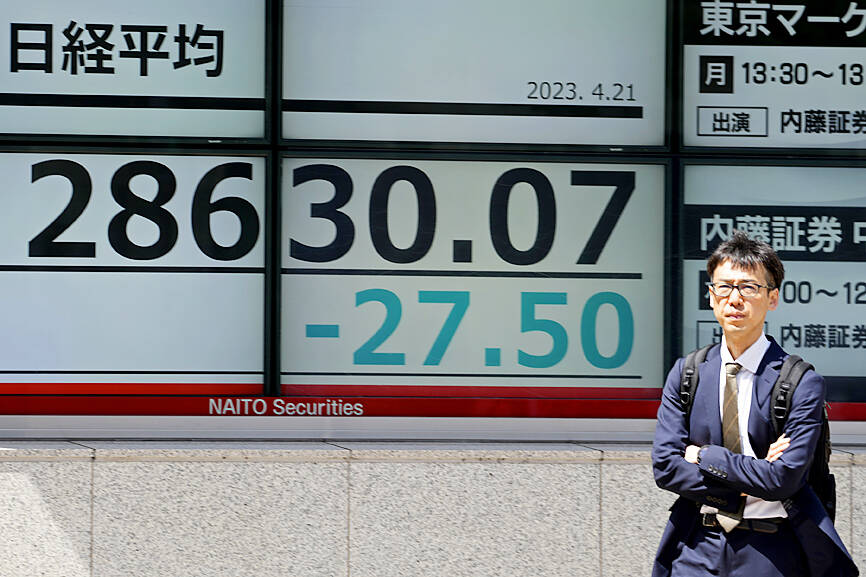Asian markets fell on Friday on lingering recession worries as data indicated that the US economy was slowing down, while US Federal Reserve officials pressed their case for further interest rate hikes to battle stubborn inflation.
The losses tracked a sell-off on Wall Street, where tech firms took a hit from bets on further monetary tightening and automakers tumbled due to concerns about a possible price war.
Investors were also spooked by earnings reports from US regional banks that pointed to a weakening profit outlook following sector turmoil last month that saw three lenders collapse.

Photo: AP
Figures showing recurring unemployment benefit claims hitting their highest level since November 2021 combined with an increase in new applications for jobless insurance pointed to a softening labor market.
That came with news that the closely watched Philadelphia Fed Manufacturing Index fell more than expected and stood in contrast to a surprise surge in the New York Empire Fed Survey on Monday.
The readings indicated the world’s top economy was beginning to feel the weight of a year-long rate hike campaign by the Fed.
However, while that suggests inflation could come down, there is a worry that a recession is coming.
“The trend higher in jobless claims clearly shows a slowing in the labor market and plays to views of a US recession in 2023,” National Australian Bank head of market economics Tapas Strickland said.
Oanda Corp senior market analyst Edward Moya said that jobless claims “will soon see new cycle highs as corporate America has steadily announced more layoffs.”
All three main indices on Wall Street ended in the red, and Asia followed.
In Taiwan, the TAIEX dropped 104.53 points, or 0.67 percent, to 15,602.99, down 2.05 percent from a week earlier. Turnover totaled NT$253.724 billion (US$8.29 billion).
Hong Kong’s Hang Seng lost 1.57 percent, closing at 20,075.73 and posting a weekly decline of 1.78 percent, while China’s Shanghai Composite Index dropped 1.95 percent to 3,301.26, down 1.11 percent on the week.
In Japan, the Nikkei 225 declined 0.33 percent to 28,564.37, but rose 0.25 percent weekly, while the broader TOPIX lost 0.23 percent to close at 2,035.06, up 0.81 percent from a week earlier.
In Seoul, the KOSPI slid 0.73 percent to 2,544.40, declining 1.05 percent weekly.
Australia’s S&P/ASX 200 dropped 0.43 percent to 7,330.4, down 0.42 percent from a week earlier. India’s SENSEX bucked the trend, inching up 0.04 percent to 59,655.06, but posted a weekly decline of 1.28 percent.
Additional reporting by staff writer, with CNA

Intel Corp chief executive officer Lip-Bu Tan (陳立武) is expected to meet with Taiwanese suppliers next month in conjunction with the opening of the Computex Taipei trade show, supply chain sources said on Monday. The visit, the first for Tan to Taiwan since assuming his new post last month, would be aimed at enhancing Intel’s ties with suppliers in Taiwan as he attempts to help turn around the struggling US chipmaker, the sources said. Tan is to hold a banquet to celebrate Intel’s 40-year presence in Taiwan before Computex opens on May 20 and invite dozens of Taiwanese suppliers to exchange views

Application-specific integrated circuit designer Faraday Technology Corp (智原) yesterday said that although revenue this quarter would decline 30 percent from last quarter, it retained its full-year forecast of revenue growth of 100 percent. The company attributed the quarterly drop to a slowdown in customers’ production of chips using Faraday’s advanced packaging technology. The company is still confident about its revenue growth this year, given its strong “design-win” — or the projects it won to help customers design their chips, Faraday president Steve Wang (王國雍) told an online earnings conference. “The design-win this year is better than we expected. We believe we will win

Chizuko Kimura has become the first female sushi chef in the world to win a Michelin star, fulfilling a promise she made to her dying husband to continue his legacy. The 54-year-old Japanese chef regained the Michelin star her late husband, Shunei Kimura, won three years ago for their Sushi Shunei restaurant in Paris. For Shunei Kimura, the star was a dream come true. However, the joy was short-lived. He died from cancer just three months later in June 2022. He was 65. The following year, the restaurant in the heart of Montmartre lost its star rating. Chizuko Kimura insisted that the new star is still down

While China’s leaders use their economic and political might to fight US President Donald Trump’s trade war “to the end,” its army of social media soldiers are embarking on a more humorous campaign online. Trump’s tariff blitz has seen Washington and Beijing impose eye-watering duties on imports from the other, fanning a standoff between the economic superpowers that has sparked global recession fears and sent markets into a tailspin. Trump says his policy is a response to years of being “ripped off” by other countries and aims to bring manufacturing to the US, forcing companies to employ US workers. However, China’s online warriors